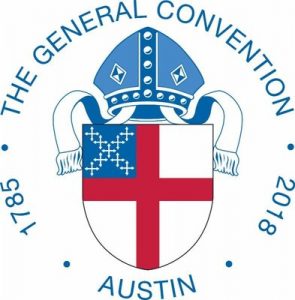 July 25, 2018
July 25, 2018
Dear Friends in Christ,
As you know, the 79th General Convention of the Episcopal Church met July 4-13 in Austin, Texas. There has been considerable discussion on social media, and elsewhere, regarding what convention actually did, and I have noticed that the “facts” vary widely. So, I thought it might be helpful to share my understanding of what this convention accomplished.
There were many, many resolutions presented to deputies and bishops, encompassing everything from creation care to Israel/Palestine to mission and evangelism. On these latter concerns, convention approved substantial funding over the next three years for evangelism and church plants. There were also occasions of strong public witness— most notably the Sunday Eucharist at the Hutto Detention Center (an ICE facility whose residents are mainly women seeking asylum in the United States), and a gathering of Bishops Against Gun Violence. There were transformative personal moments as well, including a solemn service of repentance, offering testimonies of those who had been abused by clergy, seeking God’s forgiveness for the Church and healing for the victims. Always at the center was our Presiding Bishop’s powerful preaching, urging us all to continue our witness to Jesus Christ in the power of “our loving, liberating, and life-giving God.”
Overall, I believe the convention resulted in a substantive compromise over matters that could, once again, have torn us apart. Much of this revolved around various proposals for the revision of the Book of Common Prayer (1979), including revision of the rubrics and catechism related to the marriage rites. After a great deal of effort and conversation, steps were taken to include LGBT people more deeply in the life of the whole Church, and to honor their relationships. More conservative bishops and dioceses were given ways to meet the pastoral needs of gay and lesbian couples and their congregations, while being faithful to those bishops’ deep convictions. Perhaps most important, leaders from across the Episcopal Church’s theological spectrum worked hard to create a place where all could walk together. The determination shown by this convention to hold onto one another across our differences provides a witness to the reconciling power of the Gospel in the midst of our country’s desperately polarized civic life.
I have outlined a summary of our process and results related to liturgical revision on a separate two page attachment available here, along with a link to all the resolutions of the convention. Later this summer, the General Convention Office will publish a summary of all resolutions, a link to which will be posted on our diocesan website.
I would also note a serious failure. While we corrected a monumental injustice by welcoming back the Episcopal Church in Cuba, the dioceses of Province IX were miserably represented because of the Episcopal Church’s refusal to address adequately the financial needs of our poorest churches. This injury was compounded by insult: contrary to our own rules, we failed to provide Spanish translators for certain important hearings. A resolution expressing “regret” — graciously acknowledged by Bishop Allen of Honduras— fell far short, to my mind, of the genuine grief that accompanies true repentance.
Racism is a great evil of our time and culture. How can a Church, historically so concerned with matters of social justice, treat so lightly the log in our own eye? (Matthew 7:5). Surely we have much work still to do.
In spite of this deficit, I believe the convention achieved a huge step forward in building unity across the diversity of our Church. Those attending from the Diocese of Pittsburgh helped make that happen, and so on your behalf, I thank our deputation: Michael Braxton, Lisa Brown, Nano Chalfant-Walker, Jon Delano, Joan Gundersen, Jamie McMahon, Jeff Murph, Kris Opat, Jim Simons, Steve Stagnitta, and Nancy Threadgill, as well as Scott Quinn, who was unable to attend but was with us in spirit and prayer. Betty Duckstein, Linda Getts, and Darrell Powell represented the diocesan Episcopal Church Women. All these, our ambassadors in Austin, made considerable sacrifices, including giving up vacation time, leaving their families, and incurring personal expense in order to serve the Church. They worked together and prayed together through long days and never seemed to lose their good humor and sound judgment. I am extremely proud of and grateful for them. Please join me in giving God thanks for their witness!
Faithfully your bishop,

(The Right Reverend) Dorsey W.M. McConnell, D.D.
VIII Bishop of Pittsburgh
